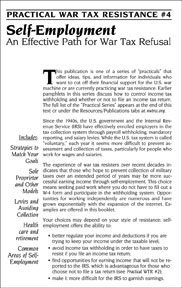Who doesn’t want to protect workers against uncaring, exploitative, profit-hungry employers? But…. there’s always a but….I’m just waking up to the fact that a wave of state laws intending to protect workers may also slam the door on freelance opportunities. The California law AB5 that just took effect pushes employers to categorize more workers as W-2 employees. Freelancers are scrambling, and articles indicate that many have lost good, paying work.
Now I see a similar law is proposed in New York, where I live. There’s a Freelancers New York campaign against it, and their website announces, “Freelancers in New York watched in horror as AB5 passed hastily in California, destroying the livelihoods of thousands of independent contractors in one vague, sweeping bill.” Maybe that’s a bit of an exaggeration as far as horror goes (there are plenty of horrors these days), but it is worrisome.
 As part of our war tax resistance counseling in the NWTRCC network, we have long pointed out that working as an independent contractor (subject to 1099 tax reporting unless off-the-books) gives individuals the freedom to decide whether and how much they are going to pay to the IRS. NWTRCC’s Practical War Tax Resistance #4, Self Employment: An Effective Path for War Tax Refusal is all about this. The key thing is that 1099 workers do not have withholding like W-2 employees, something the IRS has long been lobbying to change. Now it seems the states are going to help with that shift, along with, apparently, knocking a lot of people out of their paying freelance work.
As part of our war tax resistance counseling in the NWTRCC network, we have long pointed out that working as an independent contractor (subject to 1099 tax reporting unless off-the-books) gives individuals the freedom to decide whether and how much they are going to pay to the IRS. NWTRCC’s Practical War Tax Resistance #4, Self Employment: An Effective Path for War Tax Refusal is all about this. The key thing is that 1099 workers do not have withholding like W-2 employees, something the IRS has long been lobbying to change. Now it seems the states are going to help with that shift, along with, apparently, knocking a lot of people out of their paying freelance work.
Hopefully other freelancers will weigh in on this topic, especially those in California who may be feeling the effects of the new law. I see in the Freelancers New York FAQs that 33 states already have enacted the “ABC test,” the controversial change in this legislation. Personally I am not totally understanding the nuances in the ABC test compared to the current IRS regulations defined in the Employer’s Tax Guide (click on chapter 2, “Who Are Employees”). It seems one major problem with the ABC test is that it is vague, and employers are scared to hire freelancers because it will be hard to prove their independence if tax or labor enforcers come calling.
I think the quandary that I have felt over the past decade or so with the rise of the gig economy is that I’m all for freelancing — it’s great to set your own rate and hours and choose where you work — but watching companies like Uber and Lyft rake in profits off the labor of underpaid, no-benefits workers is another story. Of course, small employers exploit workers in many fields too, whether restaurant work, construction, house cleaning, etc.
In part the quandary comes down to: some of us are quite happy to be choosing our own hours, where we work —and whether we are going to give the feds money for war. We know we are sacrificing some protections like health and unemployment insurance, employer’s share of FICA or workers comp. Others definitely need protection.
I’ll be interested in reader comments on this legislation and whether happy and exploited independent contractors can both be accommodated under these new labor laws.
— Post by Ruth Benn
A few other links:
You’ll find many links to articles and info if you do a search. I was interested in what the National Writers Union and Freelancers Union had to say, and also ran into that “unintended consequences” piece below, which brings up some other good points.
The two sides to AB-5, and how we can fix the gap, Freelancers Union blog post, 1/23/20
National Writers Union had a September 2019 statement supporting the California bill, but now their Twitter feed has a lot about AB-5 and their hope that the New York law will be better and more specific about exemptions for freelance writers.
The Many Unintended Consequences of AB5, California Globe, 12/10/19. Maybe a more libertarian point of view but brings up some of the tax and benefit issues.






This legislation — forcing independent contractors to become waged employees — is something the IRS has been wanting for a long time. Seems like another step in the direction of reducing the ability of workers to choose how to pay — or not pay — their taxes, as is the case in many other countries.
Tax resisting independent contractors have been an anathema to the IRS because it is much harder to collect taxes from them. Waged employees facing an IRS levy are like sitting ducks as most employers, fearing the power of the IRS, readily comply and sometimes even go overboard to turn over an employee’s money in cases when they aren’t required to, as has happened to me a couple times.
However, because AB5 (and similar legislation) seems a bit fuzzy and open to interpretation, it’s unclear the full impact. Plus there are some freelance jobs that won’t be affected. We’ll see.
Great article Ruth! I have been thinking a lot about the growing gig economy as it relates to war tax resisters. Thanks for the perspectives and links.
Thank you for this piece, Ruth. I have felt that quandary, too, in my work. What I am fervently hoping is that the US will, within several years, actually have some kind of Medicare for All plan so that at least health insurance isn’t tied to employment. That would resolve a big chunk of the quandary, I think.
I totally agree Medicare will help solve some issues. I appreciate this article so much and the discussion of the balance between workers being taken advantage of and war tax resisters having freedom